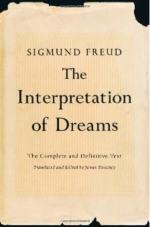
|
| Name: _________________________ | Period: ___________________ |
This test consists of 5 short answer questions and 1 (of 3) essay topics.
Short Answer Questions
1. What is very common as Freud states occurs in absurd dreams?
2. Which dreams appear alarming but are actually wish fulfillment dreams?
3. To follow up #146, the answer cannot be denied, even though the dreamer might, upon waking, deny the subject of the __________.
4. Freud thinks there is a difficulty in using dream examples when they are related out of ___________.
5. A dreamer who recognizes he is dreaming has slipped past the _____ that transpose the dream thoughts.
Essay Topics
Write an essay for ONE of the following topics:
Essay Topic 1
Freud creates a list of symbols that could be used to find sexually latent content in dreams. What are some of the symbols he shares and their meanings? Do you agree with his findings? What other symbols do you feel could be used to extrapolate a sexual meaning? What does the focus on sex seem to say abut Freud?
Essay Topic 2
Freud says that other theories for dream interpretation are illogical or they refute the value of dreams altogether. This leaves the world with few tools to help with dream interpretation. What does this seem to say about Freud? How does this lack of tools then affect those who are interested in dream interpretation? Why does Freud find the two limited methods of dream interpretation to be worthless?
Essay Topic 3
Dreams, as Freud believes, are considered to be foreign to our everyday lives and experiences. However, is this the case? In everyday life, we might have one experience and then dream about that same experience. Does this support the idea of dreams being foreign? What do you think Freud means by that? Can you give one example in which dreams become foreign in relation to real life?
|
This section contains 303 words (approx. 2 pages at 300 words per page) |

|




